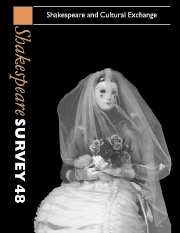Book contents
- Frontmatter
- Shakespeare Translation as Cultural Exchange
- Shakespeare, Theatre Production, and Cultural Politics
- ‘Amphitheaters in the Body’: Playing with Hands on the Shakespearian Stage
- ‘Shakespur and the Jewbill’
- Wilhelm S and Shylock
- Pilgrims of Grace: Henry IV Historicized
- Holy war in Henry V
- Hamlet and the Anxiety of Modern Japan
- Hamlet’s Last Words
- Venetian Culture and the Politics of Othello
- ‘My Music for Nothing’: Musical Negotiations in The Tempest
- The Tempest and Cultural Exchange
- Caliban and Ariel Write Back
- Shakespearian Rates of Exchange in Czechoslovakia 1945–1989
- ‘Are you a Party in this Business?’ Consolidation and Subversion in East German Shakespeare Productions
- The Martyred Knights of Georgian Shakespeariana
- Shakespeare Performances in England, 1993–1994
- Professional Shakespeare Productions in the British Isles, January – December 1993
- 1 Critical Studies
- 2 Shakespeare’s Life, Times, and Stage
- 3 Editions and Textual Studies
- Books Received
- Index
Hamlet’s Last Words
Published online by Cambridge University Press: 28 March 2007
- Frontmatter
- Shakespeare Translation as Cultural Exchange
- Shakespeare, Theatre Production, and Cultural Politics
- ‘Amphitheaters in the Body’: Playing with Hands on the Shakespearian Stage
- ‘Shakespur and the Jewbill’
- Wilhelm S and Shylock
- Pilgrims of Grace: Henry IV Historicized
- Holy war in Henry V
- Hamlet and the Anxiety of Modern Japan
- Hamlet’s Last Words
- Venetian Culture and the Politics of Othello
- ‘My Music for Nothing’: Musical Negotiations in The Tempest
- The Tempest and Cultural Exchange
- Caliban and Ariel Write Back
- Shakespearian Rates of Exchange in Czechoslovakia 1945–1989
- ‘Are you a Party in this Business?’ Consolidation and Subversion in East German Shakespeare Productions
- The Martyred Knights of Georgian Shakespeariana
- Shakespeare Performances in England, 1993–1994
- Professional Shakespeare Productions in the British Isles, January – December 1993
- 1 Critical Studies
- 2 Shakespeare’s Life, Times, and Stage
- 3 Editions and Textual Studies
- Books Received
- Index
Summary
At least three interlocking applications of the word 'culture' are currently identified: first, a general process of intellectual and spiritual development, once conceived as a unilinear movement from innocence or barbarism to civilization; second, a particular way of life, specific manners, habits, practices located in a particular people, or period, or group; and third, the works and products of intellectual and artistic activity - music, literature, painting and sculpture, theatre and film - perhaps also philosophy and history.
If, as seems appropriate, we regard culture as an active system rather than as a passive collection of disparate traits, then cultural exchange (or acculturation) is a necessary and inevitable condition of any kind of social existence: a continuous reciprocal contact between individuals, families, groups, classes, nations, and races; involving money, food, work, property, possessions, commerce, sex, and every kind of leisure and recreation, including literature and ideas. It is facilitated at every level by technology, education, communications, economic prosperity, and genuinely democratic institutions. The only naturally occurring barrier to cultural exchange is language; and even that can be overcome by translation. But it is restricted by the artificial barriers of economic, political, and ideological oppression. Governments anywhere may and do seek to regulate and control its operation; but by its nature it is spontaneous, expansive, and innovative, having the character and force of an evolutionary mechanism.
- Type
- Chapter
- Information
- Shakespeare Survey , pp. 113 - 122Publisher: Cambridge University PressPrint publication year: 1996

